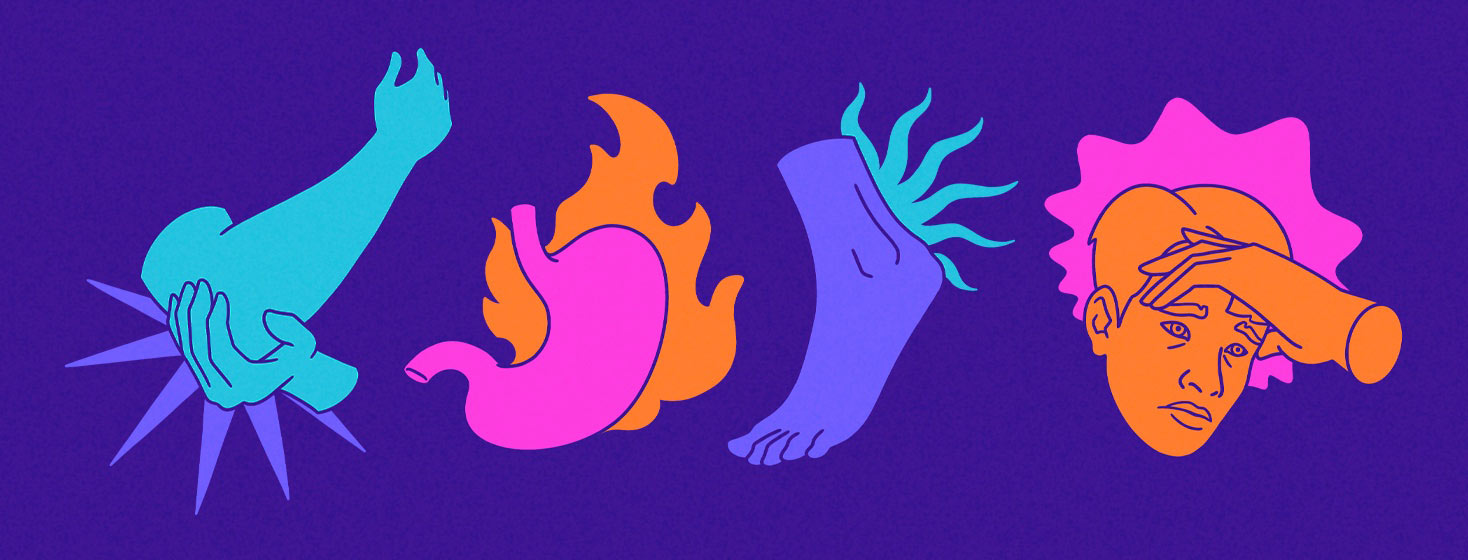HIV and Chronic Pain
Long-lasting, or chronic, pain is common in those living and aging with HIV. People can live longer with HIV if they take antiretroviral therapy (ART). But many people experience chronic pain, even when ART keeps their viral loads low.1,2
Featured Forum
View all responsesBecause pain and HIV are 2 different conditions that can happen at the same time, they are called comorbidities. Comorbid illnesses can interact in ways that make both worse. If you have HIV and chronic pain, a doctor can help you find ways to manage your pain.1
What is chronic pain with HIV?
Pain that lasts more than 3 months and is not linked to an injury is called chronic. People living with HIV often experience chronic widespread pain. It usually affects the muscles and skeleton. People living with HIV and chronic pain most commonly report having pain in their:1,3
- Joints
- Head
- Legs
- Back
People also describe:4
- Pain in the hands, feet, or abdomen
- Pain from other illnesses, like cancer or herpes
- Painful skin rashes (side effects of HIV treatments or other drugs)
- Chest pain (from infections such as tuberculosis)
- Mouth pain (from ulcers or fungal infections)
- Fibromyalgia
This or That
Are you dealing with chronic pain?
Chronic pain with HIV can make it hard to live your life. As more people are aging with HIV, more are also affected by chronic pain. More than half of people living with HIV and chronic pain rate their pain as severe. Women are more likely than men to experience chronic pain with HIV. They are also more likely to be undertreated for it.1-3
Pain can occur at any stage of HIV disease. Pain often increases in severity as the HIV disease progresses.4
What causes chronic pain with HIV?
Chronic pain in those with HIV is thought to sometimes be caused by peripheral neuropathy. Peripheral neuropathy is when damage happens to nerves outside of the brain or the spinal cord. It may cause:1,3
- Pain
- Numbness
- Weakness
Researchers have identified 3 main ways that chronic pain and HIV are linked:1
- Having HIV can trigger peripheral neuropathy.
- Peripheral neuropathy can also be caused by some of the drugs used to manage HIV.
- Long-lasting, chronic inflammation may also cause peripheral neuropathy.
Researchers are also considering other ways that HIV could be linked to pain. These include:2
- Abnormal immune responses
- Psychological factors (including substance abuse)
- Social factors (including stigma)
Scientists do not yet understand the exact processes that lead to chronic pain in those with HIV. Because of that, they cannot yet treat the pain as effectively. Untangling the processes will be key to developing targeted therapies and bringing relief.1
How should chronic pain with HIV be treated?
Prescription opioids are often given to treat chronic pain with HIV. But there are few studies on their long-term use in HIV. And current care guidelines for HIV do not recommend using opioids for long-term pain management.1
Using opioids to treat people with HIV can be problematic. Some in this community may have misused drugs in the past. And within the HIV community, people who have misused drugs are more likely to report pain. Also, if someone is currently misusing drugs, it may make their pain worse.1
People with a long history of drug misuse may also need higher doses of opioids due to tolerance. But long-term opioid use is known to increase the risk of depression. It may also worsen someone’s pain.1
Further, opioids have side effects that include upset stomach, drowsiness, and constipation.4
There are options for managing chronic pain with and without drugs. Nondrug options include:4
- Acupuncture or acupressure
- Hypnosis
- Massage
- Meditation
- Physical activity
- Stress reduction
Drug options aside from opioids include:4
- Acetaminophen
- Non-steroidal anti-inflammatory drugs (NSAIDs such as ibuprofen)
- COX-2 inhibitors (a type of NSAID that is easier on the stomach)
- Steroids
If your pain is confined to a certain area, ask your doctor about anesthetics. These can be injected beneath the skin. They can also be applied to the surface of the skin.4
Featured Forum
View all responsesWhat will your doctor consider?
Your doctor will likely need to evaluate:4
- What type of pain you are having
- Where your pain is happening
- What medicines you currently take
If the pain is caused by a drug you are taking or another illness you have, your doctor may want to address that first. In order to receive the best care possible, tell your doctor about all drugs you are taking. This includes current and past:1,4
- Recreational drugs
- Prescription drugs (whether misused or taken as directed)
- Over-the-counter drugs
- Vitamins and supplements

Join the conversation